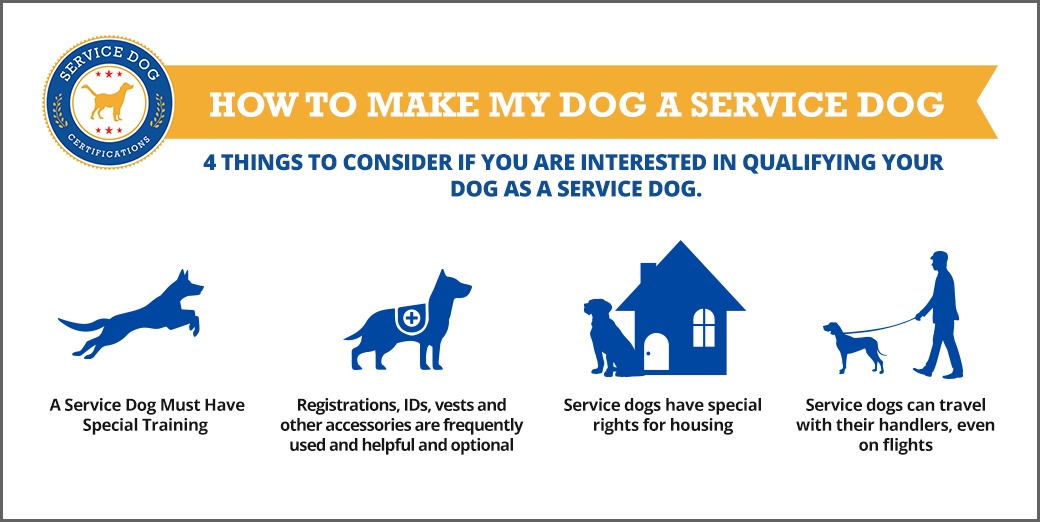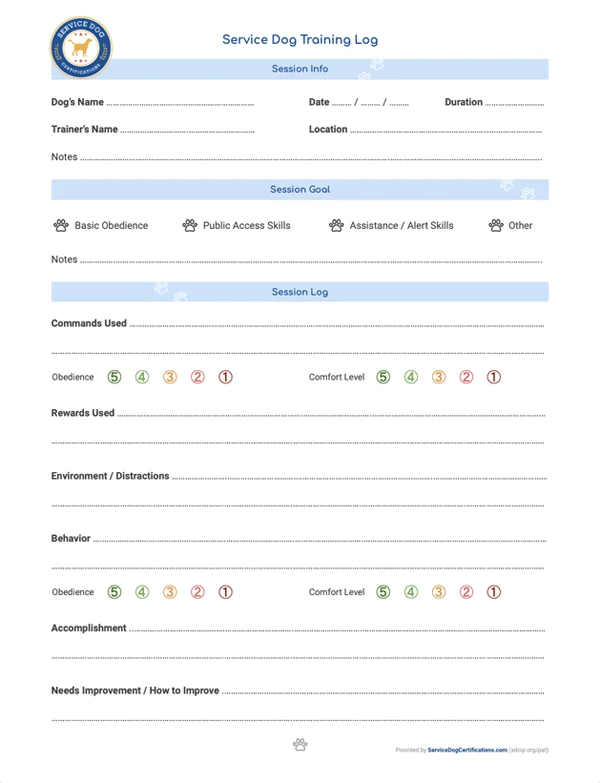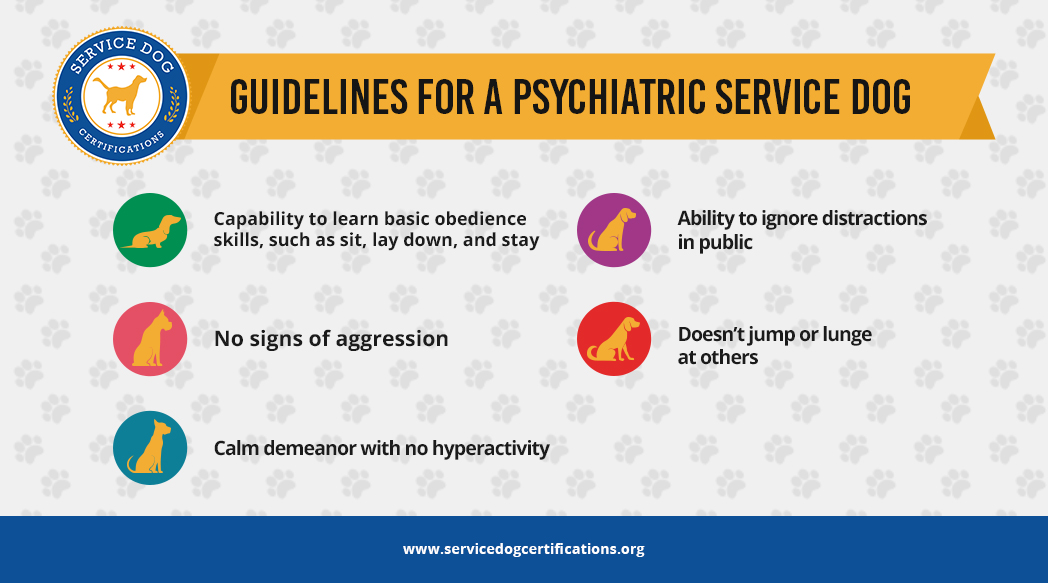How to Get a Service Dog for Anxiety

Anxiety is the most common mental health condition in the U.S., with approximately 40 million adults experiencing the disorder. In cases where a person with anxiety is unable to function at work, school, or in social situations, a psychiatric service dog can help them get back on the right track.
A psychiatric service dog is a highly trained dog that can perform specific tasks or services that the individual with a disability may not be able to accomplish on their own. Service dogs are legally allowed to follow their owners into establishments that are not usually open to animals. You can even fly with a service dog for free on planes.
These are the 4 steps for getting a service dog for anxiety:
- See whether your anxiety is a disability.
Anxiety can be a qualifying disability if it substantially limits a major life activity. Not sure if you meet this criteria? A PSD letter can help. - Adopt a suitable dog if you don’t have one.
If you don’t have a suitable dog for service dog duties, adopt a dog with the right temperament and intelligence for the task you need to help with your condition. - Train your dog to help with your anxiety.
A service dog must be individually trained to perform a job or task relating to your condition. You can self-train or use a professional trainer. - Train your dog for public access.
All service dogs must be well-behaved and in control when in public settings. They should ideally be able to pass a public access test.
How a Service Dog Can Help With Anxiety
Anxiety stems from a physiological response. The brain gauges situations as dangerous, even when a person isn’t actually in danger t or if the danger has long gone. The brain then starts the stress reaction (a so-called “fight or flight” response) and releases hormones into the body. These hormones then initiate unpleasant physical effects: hyper-awareness, rise in blood pressure, sweating, increase in heart rate, and quick breathing.
Research has shown that trained psychiatric service dogs can help humans overcome anxiety in several ways:
- Lower blood pressure and heart rate
- Provide a calming influence through deep pressure therapy, nuzzling, licking, and other touch
- Function as a protective factor against suicide and self-harm
- Provide a sense of security
- Fetch any medication or devices that may help reduce the symptoms
- Perform crowd control work
Keep in mind that in order to qualify as a service dog, there must be a need for the dog to perform a job or task relating to a person’s disability. If the dog merely provides comfort for anxiety that qualifies as a disability, it is likely an emotional support animal and not a psychiatric service dog.
Anxiety as a Disability
According to the Americans with Disability Act (ADA), a person with anxiety can be considered to have a disability if their condition “severely impacts the ability to perform one or more major life activities.”
Disabilities like severe anxiety are not visible to others, like someone in a wheelchair or a blind person with a cane. If anxiety causes impairment in a major life function such as work, school, or personal relationships, then the person may meet the definition of a disability and be able to qualify their dog as a service dog.
A healthcare provider can help someone determine if their anxiety rises to the level of a disability. They can confirm their opinion about whether you have an anxiety-related disability in a signed PSD letter. It’s worth repeating that even if a person has an anxiety disorder that qualifies as a disability, a psychiatric service dog is only appropriate if they need a job or task performed to assist with that disability. If a task-trained dog is not required, trying for emotional support animal status is probably more appropriate.

Wonder if you qualify for a Psychiatric Service Dog?
Get an assessment from a licensed medical health professional. If you qualify, they can issue a PSD Letter so that you can confidently train and own a PSD.
Training a Service Dog for Anxiety
Training a service dog for assisting anxiety requires patience but can be done on your own or with the help of a professional trainer. There are also psychiatric service dogs that are sold pre-trained, but the cost is prohibitive for most people.
Many people find the process of training a service dog to be rewarding and worthwhile in and of itself. The ADA allows for self-training of service animals, but you should always consult an expert if you’re not sure or you get stuck in the training process. Keep in mind that you not only have to train an anxiety service dog to perform its job to help you but also so that it is under your control at all times, able to maintain a calm demeanor, and ready to serve you in various public environments.
 | Keeping a training log will help with analyzing the progress of your service dog’s training. Download this free sample Service Dog Training Log, provided by Service Dog Certifications. |

About the Author: The writing team at Service Dog Certifications is made up of folks who really know their stuff when it comes to disability laws and assistance animals. Many of our writers and editors have service dogs themselves and share insights from their own experiences. All of us have a passion for disability rights and animals.
Related Articles

How Dogs Can Calm Anxiety
A person suffering from anxiety attacks experience many risks, and it’s one of the reasons why it’s prudent to consider having a service dog or emotional support animal as a companion. The animal can keep the environment safer for the individual and below are some of the ways a dogs can calm anxiety: 1) Dogs […]

Read More

How Dogs Stop Panic Attacks
When a panic attack hits, your heart races, chest tightens, and thoughts scramble, leaving you in a vulnerable state. Debilitating panic attacks can qualify as an ADA disability, and a psychiatric service dog can be trained to stop a panic attack by doing the following: • Performing deep pressure therapy that switches your nervous system […]

Read More

Service Dogs for PTSD
Service dogs for mental health, known as psychiatric service dogs (PSD), can help certain people with post-traumatic stress disorder (PTSD). A PTSD service dog can legally accompany their handler in areas open to the public, residential buildings that ban pets, and on airplanes. In this article, we will explain how a service dog can assist […]

Read More

